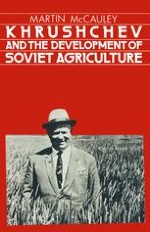1976 | Buch
Khrushchev and the Development of Soviet Agriculture
The Virgin Land Program, 1953–1964
verfasst von: Martin McCauley
Verlag: Palgrave Macmillan UK
Buchreihe : Studies in Russian and East European History and Society
Enthalten in: Professional Book Archive
